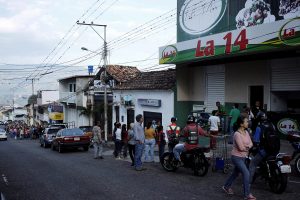
By David Brunnstrom
ABOARD U.S. GOVERNMENT AIRCRAFT (Reuters) – U.S. Secretary of State Rex Tillerson said on Wednesday the United States is getting evidence that international sanctions are “really starting to hurt” North Korea, even as he accused Russia of not implementing all of the measures.
U.S. President Donald Trump told Reuters in an interview earlier on Wednesday that Russia was helping North Korea evade international sanctions and that Pyongyang was getting closer every day to being able to deliver a long-range missile to the United States.
Tillerson told reporters the Russian failure to comply with the U.N. measures “primarily” concerned fuel “but some other areas potentially as well.” He did not provide details.
Nevertheless, Tillerson said he was confident the pressure would eventually bring North Korea to the negotiating table over its nuclear and missile programs. Pyongyang has carried out nuclear and missiles tests in defiance of U.N. and other sanctions.
“We are getting a lot of evidence that these sanctions are really starting to hurt,” Tillerson said, citing intelligence and anecdotal evidence from defectors.
He said Japan told a conference on North Korea in Vancouver on Tuesday that more than 100 North Korean fishing boats had drifted into its waters and two-thirds of those aboard them had died.
“What they learned is that they are being sent out in the winter time because there’s food shortages and they are being sent out to fish with inadequate fuel to get back,” he said.
South Korean President Moon Jae-in had attributed North Korea’s recent willingness to talk to South Korea to the pain of sanctions, Tillerson told an event at Stanford University in California.
But he later said he suspected Russia may not only be failing to implement some sanctions but “frustrating” some of the effort to press the North.
“It’s apparent to us that they’re not implementing all the sanctions and there’s some evidence they may be frustrating some of the sanctions,” Tillerson said aboard his aircraft while returning from Vancouver.
CHINESE PRESSURE
China did not attend the Vancouver meeting, where 20 nations agreed to step up sanctions pressure on the North, but Tillerson highlighted Beijing’s role.
“We have never had Chinese support for sanctions like we’re getting now,” he said. “Russia’s a slightly different issue, but the Chinese have leaned in hard on the North Koreans.”
Asked whether there was a humanitarian concern that sanctions were hurting ordinary North Koreans, he said: “That’s a choice the regime’s making. The regime gets to decide how they allocate their available resources.”
“We are not going to take any responsibility for the fact that he (North Korean leader Kim Jong Un) is choosing to make his own people suffer,” Tillerson said.
Asked if he was concerned that South Korea might resume some humanitarian aid to North Korea as part of the resumption of North-South talks this month, thereby weakening sanctions, Tillerson said: “Countries will have to make their own choice, but we would be very skeptical that aid that goes into the country will necessarily relieve the suffering of the people.”
Tillerson said that, while North Korea had a record of seeking to drive a wedge between the United States and its allies through “charm offensives,” Washington was supportive of the North-South dialogue.
Tillerson said of North Korean leader Kim Jong Un: “He knows how to reach me, if he wants to talk. But he’s got to tell me he wants to talk. We’re not going to chase him.”
He said he was confident the sides would eventually get to the negotiating table and he wanted North Korea to know that, when that happened, the United States had “very, very strong military options standing behind me.”
The Trump administration has said repeatedly that all options are available, including military ones, in forcing North Korea to give up its development of nuclear missiles capable of reaching the United States, although it prefers a diplomatic solution.
(Reporting by David Brunnstrom; Editing by Grant McCool and Robert Birsel)










